
A late one this week as I cover from the non-stop conferencing that was the Azure user group in Perth, followed by the Cyber West keynote, then the social drinks that night, the flight back home straight into the AusCERT gala dinner, the panel on data governance that morning then wrapping up with the speed debate Friday arvo. I think that's all... Anyway, better later than never and nothing too serious in this week's update. Personally, I'm finding the house works the most fun to talk about so I'm going to hit the publish button on this post now then go back to drafting the blog series on everything we've done 😊





It's a bit of a mixed bag this week with a very light-hearted look at the death of the browser padlock icon (which has been replaced by an icon that looks like a sex act), and a much more serious discussion about divorce. It took a long time to write and be ready to publish that blog post, many years in fact, but I'm so glad I did. You don't have to scroll far through the responses to the launch tweet or the comments on the blog itself to get a sense of how it's impacted people, and as I said in the very opening of the post, this sort of openness tends to be really well received. Wherever you are in your own stage of life, I hope you enjoying reading that post and share it generously with those for whom it might just make a real difference.

A sprawling online company based in Georgia that has made tens of millions of dollars purporting to sell access to jobs at the United States Postal Service (USPS) has exposed its internal IT operations and database of nearly 900,000 customers. The leaked records indicate the network’s chief technology officer in Pakistan has been hacked for the past year, and that the entire operation was created by the principals of a Tennessee-based telemarketing firm that has promoted USPS employment websites since 2016.

The website FederalJobsCenter promises to get you a job at the USPS in 30 days or your money back.
KrebsOnSecurity was recently contacted by a security researcher who said he found a huge tranche of full credit card records exposed online, and that at first glance the domain names involved appeared to be affiliated with the USPS.
Further investigation revealed a long-running international operation that has been emailing and text messaging people for years to sign up at a slew of websites that all promise they can help visitors secure employment at the USPS.
Sites like FederalJobsCenter[.]com also show up prominently in Google search results for USPS employment, and steer applicants toward making credit card “registration deposits” to ensure that one’s application for employment is reviewed. These sites also sell training, supposedly to help ace an interview with USPS human resources.
FederalJobsCenter’s website is full of content that makes it appear the site is affiliated with the USPS, although its “terms and conditions” state that it is not. Rather, the terms state that FederalJobsCenter is affiliated with an entity called US Job Services, which says it is based in Lawrenceville, Ga.
“US Job Services provides guidance, coaching, and live assistance to postal job candidates to help them perform better in each of the steps,” the website explains.
The site says applicants need to make a credit card deposit to register, and that this amount is refundable if the applicant is not offered a USPS job within 30 days after the interview process.

But a review of the public feedback on US Job Services and dozens of similar names connected to this entity over the years shows a pattern of activity: Applicants pay between $39.99 and $100 for USPS job coaching services, and receive little if anything in return. Some reported being charged the same amount monthly.
The U.S. Federal Trade Commission (FTC) has sued several times over the years to disrupt various schemes offering to help people get jobs at the Postal Service. Way back in 1998, the FTC and the USPS took action against several organizations that were selling test or interview preparation services for potential USPS employees.
“Companies promising jobs with the U.S. Postal Service are breaking federal law,” the joint USPS-FTC statement said.
In that 1998 case, the defendants behind the scheme were taking out classified ads in newspapers. Ditto for a case the FTC brought in 2005. By 2008, the USPS job exam preppers had shifted to advertising their schemes mostly online. And in 2013, the FTC won a nearly $5 million judgment against a Kentucky company purporting to offer such services.
Tim McKinlay authored a report last year at Affiliateunguru.com on whether the US Job Services website job-postal[.]com was legitimate or a scam. He concluded it was a scam based on several factors, including that the website listed multiple other names (suggesting it had recently switched names), and that he got nothing from the transaction with the job site.
“They openly admit they’re not affiliated with the US Postal Service, but claim to be experts in the field, and that, just by following the steps on their site, you easily pass the postal exams and get a job in no time,” McKinlay wrote. “But it’s really just a smoke and mirrors game. The site’s true purpose is to collect $46.95 from as many people as possible. And considering how popular this job is, they’re probably making a killing.”
KrebsOnSecurity was alerted to the data exposure by Patrick Barry, chief information officer at Charlotte, NC based Rebyc Security. Barry said he found that not only was US Job Services leaking its customer payment records in real-time and going back to 2016, but its website also leaked a log file from 2019 containing the site administrator’s contact information and credentials to the site’s back-end database.
Barry shared screenshots of that back-end database, which show the email address for the administrator of US Job Services is tab.webcoder@gmail.com. According to cyber intelligence platform Constella Intelligence, that email address is tied to the LinkedIn profile for a developer in Karachi, Pakistan named Muhammed Tabish Mirza.
A search on tab.webcoder@gmail.com at DomainTools.com reveals that email address was used to register several USPS-themed domains, including postal2017[.]com, postaljobscenter[.]com and usps-jobs[.]com.
Mr. Mirza declined to respond to questions, but the exposed database information was removed from the Internet almost immediately after KrebsOnSecurity shared the offending links.
A “Campaigns” tab on that web panel listed several advertising initiatives tied to US Job Services websites, with names like “walmart drip campaign,” “hiring activity due to virus,” “opt-in job alert SMS,” and “postal job opening.”
Another page on the US Job Services panel included a script for upselling people who call in response to email and text message solicitations, with an add-on program that normally sells for $1,200 but is being “practically given away” for a limited time, for just $49.
“There’s something else we have you can take advantage of that can help you make more money,” the script volunteers. “It’s an easy to use 12-month career development plan and program to follow that will result in you getting any job you want, not just at the post office….anywhere…and then getting promoted rapidly.”
It’s bad enough that US Job Services was leaking customer data: Constella Intelligence says the email address tied to Mr. Mirza shows up in more than a year’s worth of “bot logs” created by a malware infection from the Redline infostealer.
Constella reports that for roughly a year between 2021 and 2022, a Microsoft Windows device regularly used by Mr. Mirza and his colleagues was actively uploading all of the device’s usernames, passwords and authentication cookies to cybercriminals based in Russia.
The web-based backend for US Job Services lists more than 160 people under its “Users & Teams” tab. This page indicates that access to the consumer and payment data collected by US Job Services is currently granted to several other coders who work with Mr. Mirza in Pakistan, and to multiple executives, contractors and employees working for a call center in Murfreesboro, Tennessee.
The call center — which operates as Nextlevelsupportcenters[.]com and thenextlevelsupport[.]com — curiously has several key associates with a history of registering USPS jobs-related domain names.
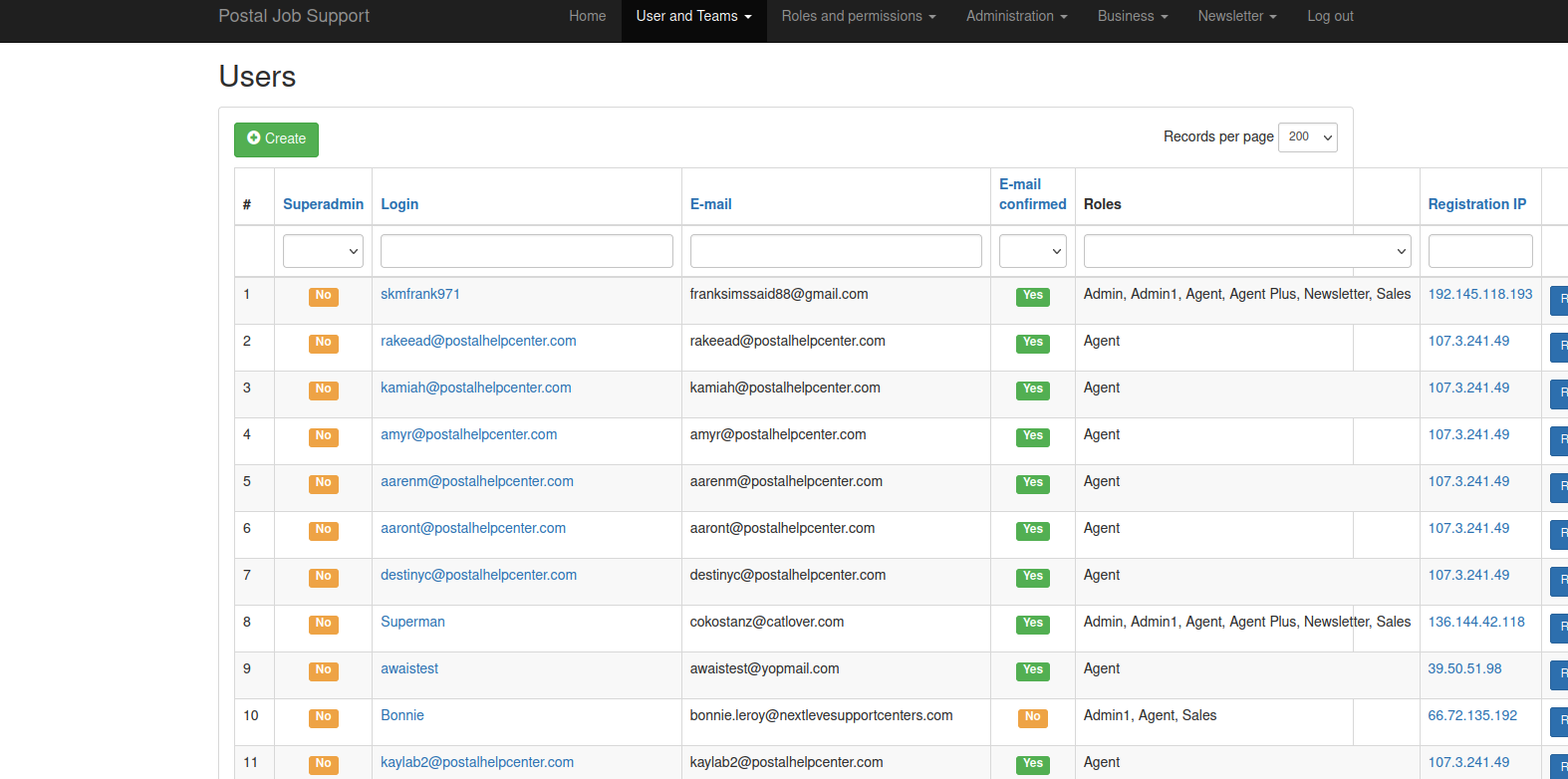
The US Job Services website has more than 160 users, including most of the employees at Next Level Support.
The website for NextLevelSupport says it was founded in 2017 by a Gary Plott, whose LinkedIn profile describes him as a seasoned telecommunications industry expert. The leaked backend database for US Job Services says Plott is a current administrator on the system, along with several other Nextlevel founders listed on the company’s site.
Reached via telephone, Plott initially said his company was merely a “white label” call center that multiple clients use to interact with customers, and that the content their call center is responsible for selling on behalf of US Job Services was not produced by NextLevelSupport.
“A few years ago, we started providing support for this postal product,” Plott said. “We didn’t develop the content but agreed we would support it.”
Interestingly, DomainTools says the Gmail address used by Plott in the US Jobs system was also used to register multiple USPS job-related domains, including postaljobssite[.]com, postalwebsite[.]com, usps-nlf[.]com, usps-nla[.]com.
Asked to reconcile this with his previous statement, Plott said he never did anything with those sites but acknowledged that his company did decide to focus on the US Postal jobs market from the very beginning.
Plott said his company never refuses to issue a money-back request from a customer, because doing so would result in costly chargebacks for NextLevel (and presumably for the many credit card merchant accounts apparently set up by Mr. Mirza).
“We’ve never been deceptive,” Plott said, noting that customers of the US Job Services product receive a digital download with tips on how to handle a USPS interview, as well as unlimited free telephone support if they need it.
“We’ve never told anyone we were the US Postal Service,” Plott continued. “We make sure people fully understand that they are not required to buy this product, but we think we can help you and we have testimonials from people we have helped. But ultimately you as the customer make that decision.”
An email address in the US Job Services teams page for another user — Stephanie Dayton — was used to register the domains postalhiringreview[.]com, and postalhiringreviewboard[.]org back in 2014. Reached for comment, Ms. Dayton said she has provided assistance to Next Level Support Centers with their training and advertising, but never in the capacity as an employee.
Perhaps the most central NextLevel associate who had access to US Job Services was Russell Ramage, a telemarketer from Warner Robins, Georgia. Ramage is listed in South Carolina incorporation records as the owner of a now-defunct call center service called Smart Logistics, a company whose name appears in the website registration records for several early and long-running US Job Services sites.

According to the state of Georgia, Russell Ramage was the registered agent of several USPS job-themed companies.
The leaked records show the email address used by Ramage also registered multiple USPS jobs-related domains, including postalhiringcenter[.]com, postalhiringreviews[.]com, postaljobs-email[.]com, and postaljobssupport1[.]com.
A review of business incorporation records in Georgia indicate Ramage was the registered agent for at least three USPS-related companies over the years, including Postal Career Placement LLC, Postal Job Services Inc., and Postal Operations Inc. All three companies were founded in 2015, and are now dissolved.
An obituary dated February 2023 says Russell Ramage recently passed away at the age of 41. No cause of death was stated, but the obituary goes on to say that Russ “Rusty” Ramage was “preceded in death by his mother, Anita Lord Ramage, pets, Raine and Nola and close friends, Nicole Reeves and Ryan Rawls.”
In 2014, then 33-year-old Ryan “Jootgater” Rawls of Alpharetta, Georgia pleaded guilty to conspiring to distribute controlled substances. Rawls also grew up in Warner Robins, and was one of eight suspects charged with operating a secret darknet narcotics ring called the Farmer’s Market, which federal prosecutors said trafficked in millions of dollars worth of controlled substances.
Reuters reported that an eighth suspect in that case had died by the time of Rawls’ 2014 guilty plea, although prosecutors declined to offer further details about that. According to his obituary, Ryan Christopher Rawls died at the age of 38 on Jan. 28, 2019.
In a comment on Ramage’s memorial wall, Stephanie Dayton said she began working with Ramage in 2006.
“Our friendship far surpassed a working one, we had a very close bond and became like brother and sister,” Dayton wrote. “I loved Russ deeply and he was like family. He was truly one of the best human beings I have ever known. He was kind and sweet and truly cared about others. Never met anyone like him. He will be truly missed. RIP brother.”
The FTC and USPS note that while applicants for many entry-level postal jobs are required to take a free postal exam, the tests are usually offered only every few years in any particular district, and there are no job placement guarantees based on score.
“If applicants pass the test by scoring at least 70 out of 100, they are placed on a register, ranked by their score,” the FTC explained. “When a position becomes open, the local post office looks to the applicable register for that geographic location and calls the top three applicants. The score is only one of many criteria taken into account for employment. The exams test general aptitude, something that cannot necessarily be increased by studying.”
The FTC says anyone interested in a job at the USPS should inquire at their local postal office, where applicants generally receive a free packet of information about required exams. More information about job opportunities at the postal service is available at the USPS’s careers website.
Michael Martel, spokesperson for the United States Postal Inspection Service, said in a written statement that the USPS has no affiliation with the websites or companies named in this story.
“To learn more about employment with USPS, visit USPS.com/careers,” Martel wrote. “If you are the victim of a crime online report it to the FBI’s Internet Crime Complaint Center (IC3) at www.ic3.gov. To report fraud committed through or toward the USPS, its employees, or customers, report it to the United States Postal Inspection Service (USPIS) at www.uspis.gov/report.”
According to the leaked back-end server for US Job Services, here is a list of the current sites selling this product:
usjobshelpcenter[.]com
usjobhelpcenter[.]com
job-postal[.]com
localpostalhiring[.]com
uspostalrecruitment[.]com
postalworkerjob[.]com
next-level-now[.]com
postalhiringcenters[.]com
postofficehiring[.]com
postaljobsplacement[.]com
postal-placement[.]com
postofficejobopenings[.]com
postalexamprep[.]com
postaljobssite[.]com
postalwebsite[.]com
postalcareerscenters[.]com
postal-hiring[.]com
postal-careers[.]com
postal-guide[.]com
postal-hiring-guide[.]com
postal-openings[.]com
postal-placement[.]com
postofficeplacements[.]com
postalplacementservices[.]com
postaljobs20[.]com
postal-jobs-placement[.]com
postaljobopenings[.]com
postalemployment[.]com
postaljobcenters[.]com
postalmilitarycareers[.]com
epostaljobs[.]com
postal-job-center[.]com
postalcareercenter[.]com
postalhiringcenters[.]com
postal-job-center[.]com
postalcareercenter[.]com
postalexamprep[.]com
postalplacementcenters[.]com
postalplacementservice[.]com
postalemploymentservices[.]com
uspostalhiring[.]com

I stand by my expression in the image above. It's a perfectly accurate representation of how I looked after receiving the CityJerks breach, clicking on the link to the website then seeing what it actually was 😳 Fortunately, the published email address on their site did go through to someone at TruckerSucker (😳😳) so they're aware of the breach and that it's circulating broadly via a public hacking website. That segment is last up in this week's video and I do give fair warning just in case you're not in the best environment to be watching that part of the update. Viewer discretion advised!

A shocking number of organizations — including banks and healthcare providers — are leaking private and sensitive information from their public Salesforce Community websites, KrebsOnSecurity has learned. The data exposures all stem from a misconfiguration in Salesforce Community that allows an unauthenticated user to access records that should only be available after logging in.

A researcher found DC Health had five Salesforce Community sites exposing data.
Salesforce Community is a widely-used cloud-based software product that makes it easy for organizations to quickly create websites. Customers can access a Salesforce Community website in two ways: Authenticated access (requiring login), and guest user access (no login required). The guest access feature allows unauthenticated users to view specific content and resources without needing to log in.
However, sometimes Salesforce administrators mistakenly grant guest users access to internal resources, which can cause unauthorized users to access an organization’s private information and lead to potential data leaks.
Until being contacted by this reporter on Monday, the state of Vermont had at least five separate Salesforce Community sites that allowed guest access to sensitive data, including a Pandemic Unemployment Assistance program that exposed the applicant’s full name, Social Security number, address, phone number, email, and bank account number.

This misconfigured Salesforce Community site from the state of Vermont was leaking pandemic assistance loan application data, including names, SSNs, email address and bank account information.
Vermont’s Chief Information Security Officer Scott Carbee said his security teams have been conducting a full review of their Salesforce Community sites, and already found one additional Salesforce site operated by the state that was also misconfigured to allow guest access to sensitive information.
“My team is frustrated by the permissive nature of the platform,” Carbee said.
Carbee said the vulnerable sites were all created rapidly in response to the Coronavirus pandemic, and were not subjected to their normal security review process.
“During the pandemic, we were largely standing up tons of applications, and let’s just say a lot of them didn’t have the full benefit of our dev/ops process,” Carbee said. “In our case, we didn’t have any native Salesforce developers when we had to suddenly stand up all these sites.”
Earlier this week, KrebsOnSecurity notified Columbus, Ohio-based Huntington Bank that its recently acquired TCF Bank had a Salesforce Community website that was leaking documents related to commercial loans. The data fields in those loan applications included name, address, full Social Security number, title, federal ID, IP address, average monthly payroll, and loan amount.
Huntington Bank has disabled the leaky TCF Bank Salesforce website. Matthew Jennings, deputy chief information security officer at Huntington, said the company was still investigating how the misconfiguration occurred, how long it lasted, and how many records may have been exposed.
KrebsOnSecurity learned of the leaks from security researcher Charan Akiri, who said he wrote a program that identified hundreds of other organizations running misconfigured Salesforce pages. But Akiri said he’s been wary of probing too far, and has had difficulty getting responses from most of the organizations he has notified to date.
“In January and February 2023, I contacted government organizations and several companies, but I did not receive any response from these organizations,” Akiri said. “To address the issue further, I reached out to several CISOs on LinkedIn and Twitter. As a result, five companies eventually fixed the problem. Unfortunately, I did not receive any responses from government organizations.”
The problem Akiri has been trying to raise awareness about came to the fore in August 2021, when security researcher Aaron Costello published a blog post explaining how misconfigurations in Salesforce Community sites could be exploited to reveal sensitive data (Costello subsequently published a follow-up post detailing how to lock down Salesforce Community sites).
On Monday, KrebsOnSecurity used Akiri’s findings to notify Washington D.C. city administrators that at least five different public DC Health websites were leaking sensitive information. One DC Health Salesforce Community website designed for health professionals seeking to renew licenses with the city leaked documents that included the applicant’s full name, address, Social Security number, date of birth, license number and expiration, and more.
Akiri said he notified the Washington D.C. government in February about his findings, but received no response. Reached by KrebsOnSecurity, interim Chief Information Security Officer Mike Rupert initially said the District had hired a third party to investigate, and that the third party confirmed the District’s IT systems were not vulnerable to data loss from the reported Salesforce configuration issue.
But after being presented with a document including the Social Security number of a health professional in D.C. that was downloaded in real-time from the DC Health public Salesforce website, Rupert acknowledged his team had overlooked some configuration settings.
Washington, D.C. health administrators are still smarting from a data breach earlier this year at the health insurance exchange DC Health Link, which exposed personal information for more than 56,000 users, including many members of Congress.
That data later wound up for sale on a top cybercrime forum. The Associated Press reports that the DC Health Link breach was likewise the result of human error, and said an investigation revealed the cause was a DC Health Link server that was “misconfigured to allow access to the reports on the server without proper authentication.”
Salesforce says the data exposures are not the result of a vulnerability inherent to the Salesforce platform, but they can occur when customers’ access control permissions are misconfigured.
“As previously communicated to all Experience Site and Sites customers, we recommend utilizing the Guest User Access Report Package to assist in reviewing access control permissions for unauthenticated users,” reads a Salesforce advisory from Sept. 2022. “Additionally, we suggest reviewing the following Help article, Best Practices and Considerations When Configuring the Guest User Profile.”
In a written statement, Salesforce said it is actively focused on data security for organizations with guest users, and that it continues to release “robust tools and guidance for our customers,” including:
Control Which Users Experience Cloud Site Users Can See
Best Practices and Considerations When Configuring the Guest User Profile
“We’ve also continued to update our Guest User security policies, beginning with our Spring ‘21 release with more to come in Summer ‘23,” the statement reads. “Lastly, we continue to proactively communicate with customers to help them understand the capabilities available to them, and how they can best secure their instance of Salesforce to meet their security, contractual, and regulatory obligations.”

I feel like a significant portion of this week's video went to discussing "the Coinbase breach that wasn't a Coinbase breach". There are various services out there that are used by the likes of password managers to alert their customers to new breaches (including HIBP in 1Password) and whoever Dashlane is using frankly, royally cocked up the attribution. What was a garden variety list of email addresses someone had just chucked the "Coinbase" name on had absolutely nothing to do with a breach of the crypto company. It's frustrating to watch, and I suspect that will come through when you watch the video too. See what you think.

We learned some remarkable new details this week about the recent supply-chain attack on VoIP software provider 3CX. The lengthy, complex intrusion has all the makings of a cyberpunk spy novel: North Korean hackers using legions of fake executive accounts on LinkedIn to lure people into opening malware disguised as a job offer; malware targeting Mac and Linux users working at defense and cryptocurrency firms; and software supply-chain attacks nested within earlier supply chain attacks.
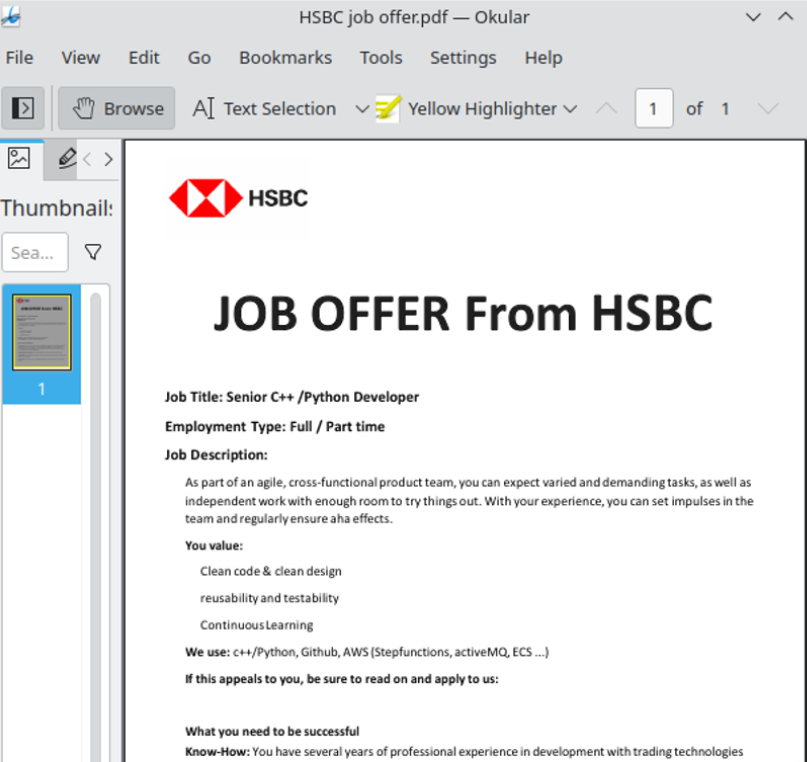
Researchers at ESET say this job offer from a phony HSBC recruiter on LinkedIn was North Korean malware masquerading as a PDF file.
In late March 2023, 3CX disclosed that its desktop applications for both Windows and macOS were compromised with malicious code that gave attackers the ability to download and run code on all machines where the app was installed. 3CX says it has more than 600,000 customers and 12 million users in a broad range of industries, including aerospace, healthcare and hospitality.
3CX hired incident response firm Mandiant, which released a report on Wednesday that said the compromise began in 2022 when a 3CX employee installed a malware-laced software package distributed via an earlier software supply chain compromise that began with a tampered installer for X_TRADER, a software package provided by Trading Technologies.
“This is the first time Mandiant has seen a software supply chain attack lead to another software supply chain attack,” reads the April 20 Mandiant report.
Mandiant found the earliest evidence of compromise uncovered within 3CX’s network was through the VPN using the employee’s corporate credentials, two days after the employee’s personal computer was compromised.
“Eventually, the threat actor was able to compromise both the Windows and macOS build environments,” 3CX said in an April 20 update on their blog.
Mandiant concluded that the 3CX attack was orchestrated by the North Korean state-sponsored hacking group known as Lazarus, a determination that was independently reached earlier by researchers at Kaspersky Lab and Elastic Security.
Mandiant found the compromised 3CX software would download malware that sought out new instructions by consulting encrypted icon files hosted on GitHub. The decrypted icon files revealed the location of the malware’s control server, which was then queried for a third stage of the malware compromise — a password stealing program dubbed ICONICSTEALER.
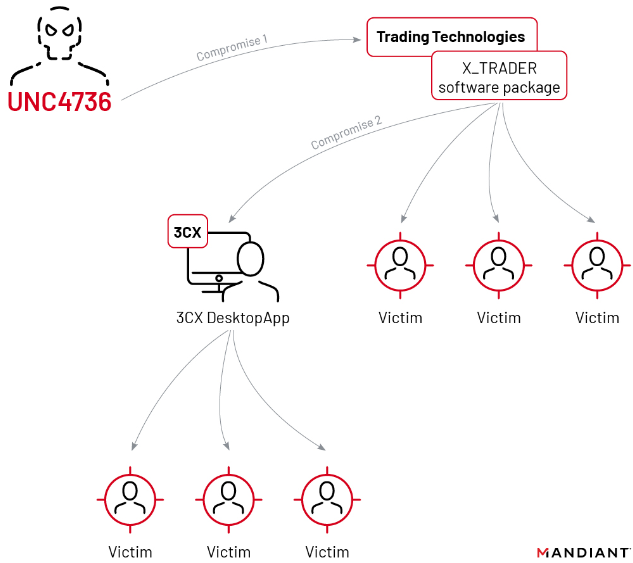
The double supply chain compromise that led to malware being pushed out to some 3CX customers. Image: Mandiant.
Meanwhile, the security firm ESET today published research showing remarkable similarities between the malware used in the 3CX supply chain attack and Linux-based malware that was recently deployed via fake job offers from phony executive profiles on LinkedIn. The researchers said this was the first time Lazarus had been spotted deploying malware aimed at Linux users.
As reported in a series last summer here, LinkedIn has been inundated this past year by fake executive profiles for people supposedly employed at a range of technology, defense, energy and financial companies. In many cases, the phony profiles spoofed chief information security officers at major corporations, and some attracted quite a few connections before their accounts were terminated.
Mandiant, Proofpoint and other experts say Lazarus has long used these bogus LinkedIn profiles to lure targets into opening a malware-laced document that is often disguised as a job offer. This ongoing North Korean espionage campaign using LinkedIn was first documented in August 2020 by ClearSky Security, which said the Lazarus group operates dozens of researchers and intelligence personnel to maintain the campaign globally.
Microsoft Corp., which owns LinkedIn, said in September 2022 that it had detected a wide range of social engineering campaigns using a proliferation of phony LinkedIn accounts. Microsoft said the accounts were used to impersonate recruiters at technology, defense and media companies, and to entice people into opening a malicious file. Microsoft found the attackers often disguised their malware as legitimate open-source software like Sumatra PDF and the SSH client Putty.
Microsoft attributed those attacks to North Korea’s Lazarus hacking group, although they’ve traditionally referred to this group as “ZINC“. That is, until earlier this month, when Redmond completely revamped the way it names threat groups; Microsoft now references ZINC as “Diamond Sleet.”
The ESET researchers said they found a new fake job lure tied to an ongoing Lazarus campaign on LinkedIn designed to compromise Linux operating systems. The malware was found inside of a document that offered an employment contract at the multinational bank HSBC.
“A few weeks ago, a native Linux payload was found on VirusTotal with an HSBC-themed PDF lure,” wrote ESET researchers Peter Kalnai and Marc-Etienne M.Leveille. “This completes Lazarus’s ability to target all major desktop operating systems. In this case, we were able to reconstruct the full chain, from the ZIP file that delivers a fake HSBC job offer as a decoy, up until the final payload.”
ESET said the malicious PDF file used in the scheme appeared to have a file extension of “.pdf,” but that this was a ruse. ESET discovered that the dot in the filename wasn’t a normal period but instead a Unicode character (U+2024) representing a “leader dot,” which is often used in tables of contents to connect section headings with the page numbers on which those sections begin.
“The use of the leader dot in the filename was probably an attempt to trick the file manager into treating the file as an executable instead of a PDF,” the researchers continued. “This could cause the file to run when double-clicked instead of opening it with a PDF viewer.”
ESET said anyone who opened the file would see a decoy PDF with a job offer from HSBC, but in the background the executable file would download additional malware payloads. The ESET team also found the malware was able to manipulate the program icon displayed by the malicious PDF, possibly because fiddling with the file extension could cause the user’s system to display a blank icon for the malware lure.
Kim Zetter, a veteran Wired.com reporter and now independent security journalist, interviewed Mandiant researchers who said they expect “many more victims” will be discovered among the customers of Trading Technologies and 3CX now that news of the compromised software programs is public.
“Mandiant informed Trading Technologies on April 11 that its X_Trader software had been compromised, but the software maker says it has not had time to investigate and verify Mandiant’s assertions,” Zetter wrote in her Zero Day newsletter on Substack. For now, it remains unclear whether the compromised X_Trader software was downloaded by people at other software firms.
If there’s a silver lining here, the X_Trader software had been decommissioned in April 2020 — two years before the hackers allegedly embedded malware in it.
“The company hadn’t released new versions of the software since that time and had stopped providing support for the product, making it a less-than-ideal vector for the North Korean hackers to infect customers,” Zetter wrote.

A bit late this week as I've prioritised time out with the family doing as many New Zealand adventure things as we can. And we've seriously maxed out the time, as you can see via the FB link below. But that hasn't stopped a couple of new data breaches flowing into HIBP nor me having some pretty direct thoughts on the premise that the vast bulk of IT pros are being told not to report data breaches. I hope you enjoy this impromptu vid from a faraway location at an odd time, I'll be back to normal again next week.






Next time I post a poll about something as simple as "when is next Friday", I don't expect I'll get as much interest. Of course "next time" will be whatever poll follows the last one, not the poll that falls after that one! But more seriously, I cannot think of a better example of ambiguous language that's open to interpretation and so easily avoided (hello MM-DD people!)
Also, Genesis Market and Operation Cookie Monster. This is just amazing stuff and a testament to a coalition of law enforcement agencies across the globe that have now made well over 100 arrests. Off the back of the NCA's DDoS market honeypot, the BreachForums admin arrest and the takedown of RaidForums before that, if you're playing in this space you'd have to be looking over your shoulder by now. Interesting times in cyber(crime) space.





Most of this week's video went on talking about the UniFi Dream Wall. What a unit! I mean it's big, but then it wraps a lot of stuff up in the one device too. If you watch this and have thoughts on how I can integrate it into the new garage such that it doesn't clash with the dark theme, I'd love to hear about it. I'll share more once I set it up in the coming weeks but for now, enjoy this week's video 🙂








I'm excited about coming to Prague. One more country to check off the list, apparently a beautiful city and perhaps what I'm most stoked about, it's the home of Prusa 3D. Writing this as I wrangle prints out of my trusty MK3S+, I'm going to do my best to catch up with folks there and see some of the super cool stuff they're doing. Other than that, this week is full of the usual; data breaches, IoT and a cold 🍺


Why can't I audio right? It's my 339th video and I still make mistakes 🙂 But it came good and we got a decent show out of it with lots of interesting engagement even though doing this a lot later in the day than usual. I found the discussion around IoT door locks especially interesting as it's a real nexus of security, usability and a bit of critical thinking about real world risks. That term "security absolutism" that came up in the comments is gold, I hope you enjoy watching this episode.





I'm going lead this post with where I finished the video because it brought the biggest smile to Charlotte's and my faces this week:
This. Is. Amazing 😍 pic.twitter.com/wOl4kpK841
— Troy Hunt (@troyhunt) March 3, 2023
When I talked about the McLaren in this week's video, Frits made the comment "the smile on your face says it all", which absolutely nailed it. But more than that, it brings a smile to the face of everyone who sees it (I suspect the colour helps), we're just loving seeing the excitement expressed by kids and adults alike. It's so much fun 😊
Less fun is dealing with Eye4Fraud. 24 hours on from recording this video, there's still zero visible progress and I lament that this one is just going to slip beneath the radar. If you're in the breach, do push for answers, it really shouldn't be this hard. All that and more in this week's video, enjoy!

The domain name registrar Freenom, whose free domain names have long been a draw for spammers and phishers, has stopped allowing new domain name registrations. The move comes after the Dutch registrar was sued by Meta, which alleges the company ignores abuse complaints about phishing websites while monetizing traffic to those abusive domains.
Freenom is the domain name registry service provider for five so-called “country code top level domains” (ccTLDs), including .cf for the Central African Republic; .ga for Gabon; .gq for Equatorial Guinea; .ml for Mali; and .tk for Tokelau.
Freenom has always waived the registration fees for domains in these country-code domains, presumably as a way to encourage users to pay for related services, such as registering a .com or .net domain, for which Freenom does charge a fee.
On March 3, 2023, social media giant Meta sued Freenom in a Northern California court, alleging cybersquatting violations and trademark infringement. The lawsuit also seeks information about the identities of 20 different “John Does” — Freenom customers that Meta says have been particularly active in phishing attacks against Facebook, Instagram, and WhatsApp users.
The lawsuit points to a 2021 study (PDF) on the abuse of domains conducted by Interisle Consulting Group, which discovered that those ccTLDs operated by Freenom made up five of the Top Ten TLDs most abused by phishers.
“The five ccTLDs to which Freenom provides its services are the TLDs of choice for cybercriminals because Freenom provides free domain name registration services and shields its customers’ identity, even after being presented with evidence that the domain names are being used for illegal purposes,” the complaint charges. “Even after receiving notices of infringement or phishing by its customers, Freenom continues to license new infringing domain names to those same customers.”
Meta further alleges that “Freenom has repeatedly failed to take appropriate steps to investigate and respond appropriately to reports of abuse,” and that it monetizes the traffic from infringing domains by reselling them and by adding “parking pages” that redirect visitors to other commercial websites, websites with pornographic content, and websites used for malicious activity like phishing.
Freenom has not yet responded to requests for comment. But attempts to register a domain through the company’s website as of publication time generated an error message that reads:
“Because of technical issues the Freenom application for new registrations is temporarily out-of-order. Please accept our apologies for the inconvenience. We are working on a solution and hope to resume operations shortly. Thank you for your understanding.”
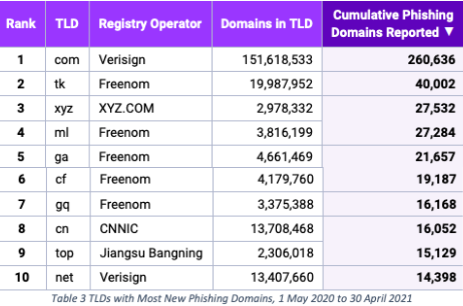
Image: Interisle Consulting Group, Phishing Landscape 2021, Sept. 2021.
Although Freenom is based in The Netherlands, some of its other sister companies named as defendants in the lawsuit are incorporated in the United States.
Meta initially filed this lawsuit in December 2022, but it asked the court to seal the case, which would have restricted public access to court documents in the dispute. That request was denied, and Meta amended and re-filed the lawsuit last week.
According to Meta, this isn’t just a case of another domain name registrar ignoring abuse complaints because it’s bad for business. The lawsuit alleges that the owners of Freenom “are part of a web of companies created to facilitate cybersquatting, all for the benefit of Freenom.”
“On information and belief, one or more of the ccTLD Service Providers, ID Shield, Yoursafe, Freedom Registry, Fintag, Cervesia, VTL, Joost Zuurbier Management Services B.V., and Doe Defendants were created to hide assets, ensure unlawful activity including cybersquatting and phishing goes undetected, and to further the goals of Freenom,” Meta charged.
It remains unclear why Freenom has stopped allowing domain registration. In June 2015, ICANN suspended Freenom’s ability to create new domain names or initiate inbound transfers of domain names for 90 days. According to Meta, the suspension was premised on ICANN’s determination that Freenom “has engaged in a pattern and practice of trafficking in or use of domain names identical or confusingly similar to a trademark or service mark of a third party in which the Registered Name Holder has no rights or legitimate interest.”
A spokesperson for ICANN said the organization has no insight as to why Freenom might have stopped registering domain names. But it said Freenom (d/b/a OpenTLD B.V.) also received formal enforcement notices from ICANN in 2017 and 2020 for violating different obligations.
A copy of the amended complaint against Freenom, et. al, is available here (PDF).
March 8, 6:11 p.m. ET: Updated story with response from ICANN. Corrected attribution of the domain abuse report.

Guns! You know, the things you kinda want to keep pretty well protected and out of the hands of nefarious parties, like the kinds of folks that following their data breach could match firearms to an individual at an address on a phone number of a gender and specific age. But don't worry, no financial information was compromised! 🤦♂️
All that and more in the 337th addition of my weekly update, enjoy!


Image: Shutterstock.com
Three different cybercriminal groups claimed access to internal networks at communications giant T-Mobile in more than 100 separate incidents throughout 2022, new data suggests. In each case, the goal of the attackers was the same: Phish T-Mobile employees for access to internal company tools, and then convert that access into a cybercrime service that could be hired to divert any T-Mobile user’s text messages and phone calls to another device.
The conclusions above are based on an extensive analysis of Telegram chat logs from three distinct cybercrime groups or actors that have been identified by security researchers as particularly active in and effective at “SIM-swapping,” which involves temporarily seizing control over a target’s mobile phone number.
Countless websites and online services use SMS text messages for both password resets and multi-factor authentication. This means that stealing someone’s phone number often can let cybercriminals hijack the target’s entire digital life in short order — including access to any financial, email and social media accounts tied to that phone number.
All three SIM-swapping entities that were tracked for this story remain active in 2023, and they all conduct business in open channels on the instant messaging platform Telegram. KrebsOnSecurity is not naming those channels or groups here because they will simply migrate to more private servers if exposed publicly, and for now those servers remain a useful source of intelligence about their activities.
Each advertises their claimed access to T-Mobile systems in a similar way. At a minimum, every SIM-swapping opportunity is announced with a brief “Tmobile up!” or “Tmo up!” message to channel participants. Other information in the announcements includes the price for a single SIM-swap request, and the handle of the person who takes the payment and information about the targeted subscriber.
The information required from the customer of the SIM-swapping service includes the target’s phone number, and the serial number tied to the new SIM card that will be used to receive text messages and phone calls from the hijacked phone number.
Initially, the goal of this project was to count how many times each entity claimed access to T-Mobile throughout 2022, by cataloging the various “Tmo up!” posts from each day and working backwards from Dec. 31, 2022.
But by the time we got to claims made in the middle of May 2022, completing the rest of the year’s timeline seemed unnecessary. The tally shows that in the last seven-and-a-half months of 2022, these groups collectively made SIM-swapping claims against T-Mobile on 104 separate days — often with multiple groups claiming access on the same days.
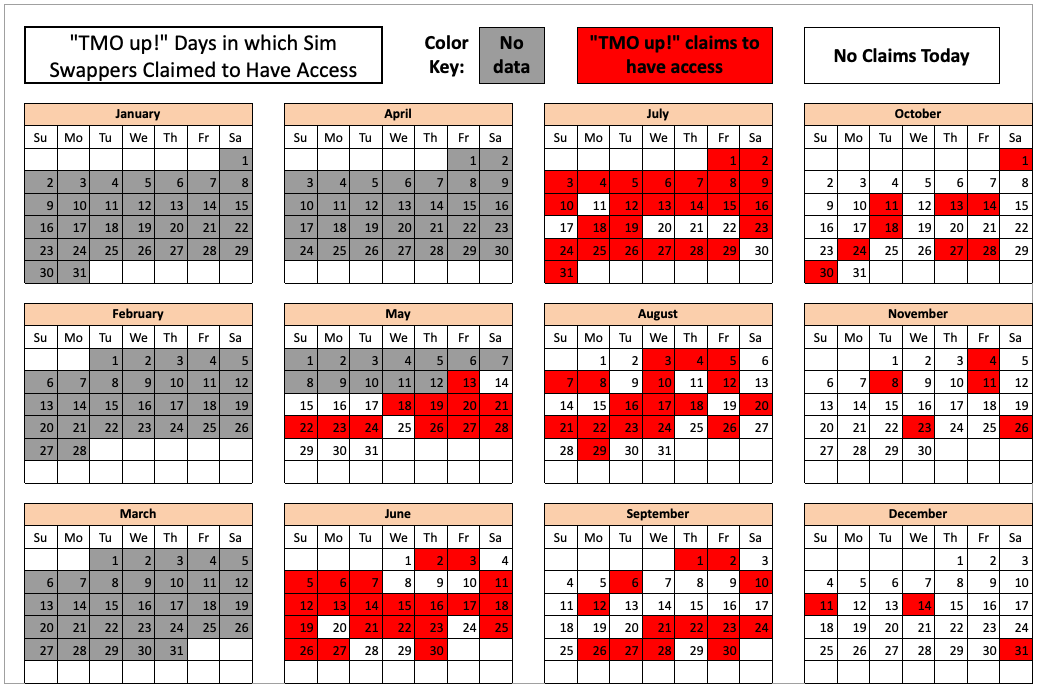
The 104 days in the latter half of 2022 in which different known SIM-swapping groups claimed access to T-Mobile employee tools.
KrebsOnSecurity shared a large amount of data gathered for this story with T-Mobile. The company declined to confirm or deny any of these claimed intrusions. But in a written statement, T-Mobile said this type of activity affects the entire wireless industry.
“And we are constantly working to fight against it,” the statement reads. “We have continued to drive enhancements that further protect against unauthorized access, including enhancing multi-factor authentication controls, hardening environments, limiting access to data, apps or services, and more. We are also focused on gathering threat intelligence data, like what you have shared, to help further strengthen these ongoing efforts.”
While it is true that each of these cybercriminal actors periodically offer SIM-swapping services for other mobile phone providers — including AT&T, Verizon and smaller carriers — those solicitations appear far less frequently in these group chats than T-Mobile swap offers. And when those offers do materialize, they are considerably more expensive.
The prices advertised for a SIM-swap against T-Mobile customers in the latter half of 2022 ranged between USD $1,000 and $1,500, while SIM-swaps offered against AT&T and Verizon customers often cost well more than twice that amount.

To be clear, KrebsOnSecurity is not aware of specific SIM-swapping incidents tied to any of these breach claims. However, the vast majority of advertisements for SIM-swapping claims against T-Mobile tracked in this story had two things in common that set them apart from random SIM-swapping ads on Telegram.
First, they included an offer to use a mutually trusted “middleman” or escrow provider for the transaction (to protect either party from getting scammed). More importantly, the cybercriminal handles that were posting ads for SIM-swapping opportunities from these groups generally did so on a daily or near-daily basis — often teasing their upcoming swap events in the hours before posting a “Tmo up!” message announcement.
In other words, if the crooks offering these SIM-swapping services were ripping off their customers or claiming to have access that they didn’t, this would be almost immediately obvious from the responses of the more seasoned and serious cybercriminals in the same chat channel.
There are plenty of people on Telegram claiming to have SIM-swap access at major telecommunications firms, but a great many such offers are simply four-figure scams, and any pretenders on this front are soon identified and banned (if not worse).
One of the groups that reliably posted “Tmo up!” messages to announce SIM-swap availability against T-Mobile customers also reliably posted “Tmo down!” follow-up messages announcing exactly when their claimed access to T-Mobile employee tools was discovered and revoked by the mobile giant.
A review of the timestamps associated with this group’s incessant “Tmo up” and “Tmo down” posts indicates that while their claimed access to employee tools usually lasted less than an hour, in some cases that access apparently went undiscovered for several hours or even days.
How could these SIM-swapping groups be gaining access to T-Mobile’s network as frequently as they claim? Peppered throughout the daily chit-chat on their Telegram channels are solicitations for people urgently needed to serve as “callers,” or those who can be hired to social engineer employees over the phone into navigating to a phishing website and entering their employee credentials.
Allison Nixon is chief research officer for the New York City-based cybersecurity firm Unit 221B. Nixon said these SIM-swapping groups will typically call employees on their mobile devices, pretend to be someone from the company’s IT department, and then try to get the person on the other end of the line to visit a phishing website that mimics the company’s employee login page.
Nixon argues that many people in the security community tend to discount the threat from voice phishing attacks as somehow “low tech” and “low probability” threats.
“I see it as not low-tech at all, because there are a lot of moving parts to phishing these days,” Nixon said. “You have the caller who has the employee on the line, and the person operating the phish kit who needs to spin it up and down fast enough so that it doesn’t get flagged by security companies. Then they have to get the employee on that phishing site and steal their credentials.”
In addition, she said, often there will be yet another co-conspirator whose job it is to use the stolen credentials and log into employee tools. That person may also need to figure out how to make their device pass “posture checks,” a form of device authentication that some companies use to verify that each login is coming only from employer-issued phones or laptops.
For aspiring criminals with little experience in scam calling, there are plenty of sample call transcripts available on these Telegram chat channels that walk one through how to impersonate an IT technician at the targeted company — and how to respond to pushback or skepticism from the employee. Here’s a snippet from one such tutorial that appeared recently in one of the SIM-swapping channels:
“Hello this is James calling from Metro IT department, how’s your day today?”
(yea im doing good, how r u)
i’m doing great, thank you for asking
i’m calling in regards to a ticket we got last week from you guys, saying you guys were having issues with the network connectivity which also interfered with [Microsoft] Edge, not letting you sign in or disconnecting you randomly. We haven’t received any updates to this ticket ever since it was created so that’s why I’m calling in just to see if there’s still an issue or not….”
The TMO UP data referenced above, combined with comments from the SIM-swappers themselves, indicate that while many of their claimed accesses to T-Mobile tools in the middle of 2022 lasted hours on end, both the frequency and duration of these events began to steadily decrease as the year wore on.

T-Mobile declined to discuss what it may have done to combat these apparent intrusions last year. However, one of the groups began to complain loudly in late October 2022 that T-Mobile must have been doing something that was causing their phished access to employee tools to die very soon after they obtained it.
One group even remarked that they suspected T-Mobile’s security team had begun monitoring their chats.
Indeed, the timestamps associated with one group’s TMO UP/TMO DOWN notices show that their claimed access was often limited to less than 15 minutes throughout November and December of 2022.
Whatever the reason, the calendar graphic above clearly shows that the frequency of claimed access to T-Mobile decreased significantly across all three SIM-swapping groups in the waning weeks of 2022.
T-Mobile US reported revenues of nearly $80 billion last year. It currently employs more than 71,000 people in the United States, any one of whom can be a target for these phishers.
T-Mobile declined to answer questions about what it may be doing to beef up employee authentication. But Nicholas Weaver, a researcher and lecturer at University of California, Berkeley’s International Computer Science Institute, said T-Mobile and all the major wireless providers should be requiring employees to use physical security keys for that second factor when logging into company resources.

A U2F device made by Yubikey.
“These breaches should not happen,” Weaver said. “Because T-Mobile should have long ago issued all employees security keys and switched to security keys for the second factor. And because security keys provably block this style of attack.”
The most commonly used security keys are inexpensive USB-based devices. A security key implements a form of multi-factor authentication known as Universal 2nd Factor (U2F), which allows the user to complete the login process simply by inserting the USB key and pressing a button on the device. The key works without the need for any special software drivers.
The allure of U2F devices for multi-factor authentication is that even if an employee who has enrolled a security key for authentication tries to log in at an impostor site, the company’s systems simply refuse to request the security key if the user isn’t on their employer’s legitimate website, and the login attempt fails. Thus, the second factor cannot be phished, either over the phone or Internet.
Nixon said one confounding aspect of SIM-swapping is that these criminal groups tend to recruit teenagers to do their dirty work.
“A huge reason this problem has been allowed to spiral out of control is because children play such a prominent role in this form of breach,” Nixon said.
Nixon said SIM-swapping groups often advertise low-level jobs on places like Roblox and Minecraft, online games that are extremely popular with young adolescent males.
“Statistically speaking, that kind of recruiting is going to produce a lot of people who are underage,” she said. “They recruit children because they’re naive, you can get more out of them, and they have legal protections that other people over 18 don’t have.”
For example, she said, even when underage SIM-swappers are arrested, the offenders tend to go right back to committing the same crimes as soon as they’re released.
In January 2023, T-Mobile disclosed that a “bad actor” stole records on roughly 37 million current customers, including their name, billing address, email, phone number, date of birth, and T-Mobile account number.
In August 2021, T-Mobile acknowledged that hackers made off with the names, dates of birth, Social Security numbers and driver’s license/ID information on more than 40 million current, former or prospective customers who applied for credit with the company. That breach came to light after a hacker began selling the records on a cybercrime forum.
In the shadow of such mega-breaches, any damage from the continuous attacks by these SIM-swapping groups can seem insignificant by comparison. But Nixon says it’s a mistake to dismiss SIM-swapping as a low volume problem.
“Logistically, you may only be able to get a few dozen or a hundred SIM-swaps in a day, but you can pick any customer you want across their entire customer base,” she said. “Just because a targeted account takeover is low volume doesn’t mean it’s low risk. These guys have crews that go and identify people who are high net worth individuals and who have a lot to lose.”
Nixon said another aspect of SIM-swapping that causes cybersecurity defenders to dismiss the threat from these groups is the perception that they are full of low-skilled “script kiddies,” a derisive term used to describe novice hackers who rely mainly on point-and-click hacking tools.
“They underestimate these actors and say this person isn’t technically sophisticated,” she said. “But if you’re rolling around in millions worth of stolen crypto currency, you can buy that sophistication. I know for a fact some of these compromises were at the hands of these ‘script kiddies,’ but they’re not ripping off other people’s scripts so much as hiring people to make scripts for them. And they don’t care what gets the job done, as long as they get to steal the money.”

Hey, it's double-Troy! I'm playing with the Insta360 Link cam, a gimbal-based model that can follow you around the room. It's tiny and pretty awesome for what it is, I'm doing some back-to-back with that and my usual Sony a6400 this week. A little note on that: during the live stream someone suggested there was some lag from that camera (very minor, they suggested), but others couldn't see it. I've just been watching a bit of the video while writing up this post and I reckon they're right. Try the 3:02 mark, for example, where on Insta360 Link I have my finger up but on the Sony a6400, I don't:

It's very minor, but it's just enough to notice. Anyway, see what you think, all that a much more in weekly update 336:
